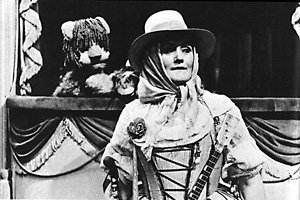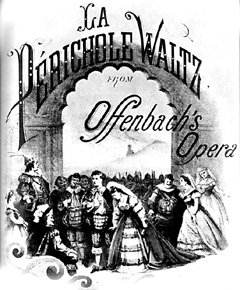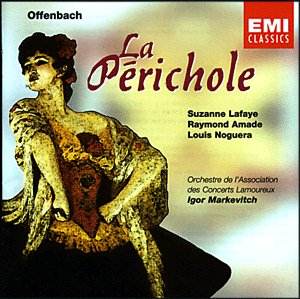
This
set is one of the earliest of the recent EMI reissues of operetta recordings
with dialogue in the French translation.
Jacques Offenbach has often been described as
the king of operetta, or more precisely of opéra-comique. Various
works can be found under the heading of "operetta", and the line separating
them from opéra-comique is by no means a straight one. To look
at what Offenbach does: he expressly gives his most important works
the title "opéra-bouffes", to emphasise both their
musical ambitions and their satirical side. This is the case with La
belle Hélène, La Vie Parisienne, and of course with
La Périchole. At the Théâtre des Variéties,
La Perichole opened on 6 October 1868. On that occasion the title
rôle had the voice and figure of Hortense Schneider (already famous
for her incarnations of Hélène and the Grand
Duchess of Gérolstein), and partnered by the celebrated José
Dupuis as Piquillo. Offenbach had been joined in his efforts to bring
the character to the lyric stage by the widely renowned librettists,
Henri Meilhac and Ludovic Halévy. The piece was repeated, also
at the Théâtre des Variéties, on 25 April 1874,
this time re-worked into three acts instead of two. It had lost none
of its charm and verve: La Périchole contains some caricature,
as in the character of the viceroy, a petty potentate more concerned
with his amorous conquests than with the well-being of his subjects,
and who is surrounded by cowardly and malicious courtiers. It also contains
parody, which is musical in nature, with undisguised allusions (recognizable
to all at the time) to Donizetti's La Favorite, and in the famous
"letter-song" to Massenet's Manon. In contrast, the atmosphere
of La Périchole is tinged with seriousness (since the
heroes are two poor, misunderstood street entertainers dying of hunger),
and with tenderness (for they adore each other, an amorous couple in
times of trial). So, is it an Opéra-bouffe? It's much
more. It's a step towards the final masterpiece, The Tales of Hoffmann.
– So writes Michel Parouty informatively in his CD notes.
The main character of this romantic operetta is a street
singer, Périchole, who has a place of honour among operatic heroines,
existing in works other than this one by Offenbach. She did in fact
exist as an exuberant Peruvian street singer who had Lima worshipping
at her feet. She was the daughter of José de Villegas and the
heiress of an important Spanish family in the Peruvian capital, Teresa
Hurtado de Mendoza. Her name was Michaela Villegas, born in 1748 and
dying in 1819, she was famous not only as an entertainer but also as
the mistress of the Viceroy of Peru. She ended her days as a Carmelite.
In 1995 one of her descendants, Bertrand Villegas, living in Paris,
wrote a fictional biography of her. This out-of-the ordinary character
had fascinated others before him. First there was Prosper Mérimée,
who as part of his Théâtre de Clara Gazul in 1829 recounted
some stories about her in Le Carrosse du Saint-Sacrement, which
in 1948 inspired an opera by Henri Busser (and another by the British
composer, Lord Berners, recorded on Marco Polo). There was also Jean
Renoir, whose Le Carrosse d'Or (1953) was a well-received success.
And here Jacques Offenbach, and his La Périchole - the
insult ("perra choia" which means "creole bitch") had been thrown
at the impetuous, wayward young woman by her protector, where it stuck
as if it were her name.
Act 1 is set in Lima on the Viceroy's birthday. The
ruler himself is walking around the town, making new conquests and listening
to what his subjects are saying. Despite his disguise he is recognized
by all. A street-singer, Périchole, and her companion, Piquillo,
do their act in vain before an indifferent audience. While the young
man tries to go round taking a few pence, Périchole faints of
hunger. Don Andrès sees her and is thunderstruck; he wants to
take her to court and make her a lady-in-waiting, and racked with hunger,
she accepts, after writing a letter to Piquillo. But a lady-in-waiting
has to be married: a husband has to be found for her. The Count of Panatellas
meets Piquillo, on the point of hanging himself; he suggests that he
should become the husband of a lady of the court, and to persuade him,
gets him drunk. Don Andrès has done the same thing to Périchole,
and when the two young people face the registrar they are tipsy. The
young woman may have recognized the man she loves, but the converse
is not true. They are both taken to the palace.
In Act 2 the courtiers, having learned that the monarch's
new favourite is an ordinary street entertainer, do not hold back their
comments, including those to the husband, Piquillo, who now that his
drunkenness has passed, has no recollection of what has happened. Only
one thing matters to him: to find Périchole. But he has to present
his wife at court. Recognizing her, he is convinced that his beloved
has been unfaithful and repulses her violently. He is taken to the dungeon
reserved for "recalcitrant husbands".
Act 3 opens in a dungeon cell where Piquillo is visited
by Panatellas and the governor, who congratulates him on having saved
the honour of husbands. He is also visited by Périchole, who
comes to explain the situation. They decide to flee, and the young woman
decides to bribe the jailer. But the person who answers is in fact the
disguised Don Andrès. When they offer him jewels, he unmasks
and orders the two lovers to be thrown into chains, specifying in an
aside that Périchole will only have to sing a song for him to
come and release her. This she does, but meanwhile, with the aid of
an old prisoner, the captives are freed. When Don Andrès comes
back they tie him up and escape. They are found in the streets of Lima,
fleeing their pursuers. Finally, they come to ask forgiveness with a
song, "The Clemency of Augustus". Of course, they end up pardoned.
Offenbach’s score contains some catchy tunes and stirring
moments. Try the marching duet "Le conquérant dit a la
jeune indienne" (CD1 tk.6) with its staccato catch-syllables.
The most memorable number is Périchole’s letter song "O
mon cher amant" (CD1 tk.10) which is sung by Suzanne Lafaye
with the right quality of lyrical sensuousness. By contrast she also
provides a comic drunken take-off (with balletic overtones) in "Ah!
Quel diner" (CD1 tk.13) with good characterisation. Perhaps
the nearest Offenbach gets to a Peruvian identity is in two numbers;
the unusual, piccolo-led finale with the choir and notaries (CD1 tk12),
and the finale to Act 3 with its accentuated minor key (CD2 tk.21).
The music elsewhere is firmly French.
Raymond Amade is a particularly thin tenor with little
vibrato that makes Piquillo sound unemotional in some of the romantic
passages. He displays an interesting quality of timbre, which could
work in the role on stage, but there is an occasional uneveness in delivery
noticed in this recording. Generally, Lafaye and Amade make a good partnership.
Their Act 1 duet (CD1 tk.6) is well delivered yet their Act 3 duet finale
(CD2 tk.21) is harsh and sung without much feeling.
Markevitch has well rehearsed the company and maintains
tight reins in his direction of the orchestra. In the Galop de l’arrestation
(CD2 tk.7) soloists and choir are required to sing short syllables in
unison at a rapid pace. All keep absolutely in step (a difficult achievement
with so many singing). The duo singing of Pierre Germain (Don Pedro)
Jean-Christophe Beniot Le Comte) in the catchy Bolero (CD2 tk.10) is
good and well matched.
A more modern stereo complete recording (1992) of La
Perichole can be found with the Rhine Opera and Strasbourg Philharmonic
Orchestra under Lombard on Erato 2292-45686-2. The recording of this
EMI 2 CD set was made in 1958 at the end of the mono era and shortly
before stereo recording became a standard in international studios.
However, this well-priced reissue should not dissuade the listener for
the balance and clarity is good and does not distract from the confident
performance and charming music. The transfer to CD is acceptable but
the chorus sound shrill due to the exaggeration reverberation provided
and the elimination of their low frequencies. The orchestra’s slightly
distant placing gives the first violins a sense of fullness, which to
my ear is pleasantly fitting for Offenbach. The track indexing sometimes
unhelpfully cues the text leading into a number and could have been
better arranged. With this mid price issue, brief notes in French and
English are included. The track listing is in parts incomplete: on some
tracks the soloist/s singing a number are missing.
Further reading: "Operetta", Traubner (Oxford 1883); ‘Musicals",
Ganzl (Carlton 1995)
Raymond Walker

Pics:
1. Joan Sutherland as Périchole in a 1973 TV production (Courtesy
of Kroll Productions, Inc./Oxford 1983)
2. Piano music sold in Britain c.1875 (Oxford 1983)

![]() Opéra comique (mono
recording complete, with dialogue in French)
Opéra comique (mono
recording complete, with dialogue in French) ![]() EMI 574 0882 [CD1
48.20 CD2 45.16] Mono ADD Midprice
EMI 574 0882 [CD1
48.20 CD2 45.16] Mono ADD Midprice
